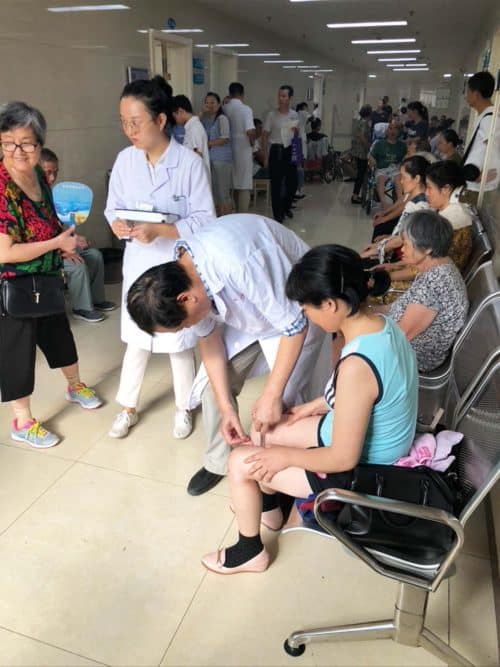OBJECTIVE:
To observe the clinical effects of acupuncture therapy for alopecia areata.

Patients lining up to receive acupuncture treatment for a variety of conditions in Hefei, Anhui China.
METHODS:
Seventy-eight patients were randomly divided into two groups. 43 cases in the treatment group were treated by acupuncture and pricking of plum-blossom needle therapy. 35 cases in the control group were treated with oral administration of Cystine tablets, Vit B1, and topical wash with Minoxidil Solution. The therapeutic effects were assessed after 4-month treatment in the two groups.
RESULTS:
The curative effect and total effective rates were 58.1% and 97.7% in the treatment group, and 34.3% and 77.1% in the control group respectively, with statistical differences in the curative rate and total effective rate between the two groups (both P<0.05).
CONCLUSION:
Acupuncture is better than medications in the treatment of alopecia areata.
Resources
1- Clinical observation on acupuncture treatment of alopecia areata
Journal of Acupuncture and Tuina Science
June 2011, Volume 9, Issue 3, pp 162-164
Qiyu Zhu 朱启玉, Fanghua Wu 吴芳华
Alopecia also called AA happens when the immune system attacks the hair follicles. Stress is thought to be a major contributor. There are many treatments available for this condition. At Acupuncture Zen in Delray Beach, we use a combination of Acupuncture, K Laser, or Low-Level Laser Treatment along with Chinese herbal medicine to alleviate symptoms and improve hair growth. There have been many patients that have sought treatment for this condition at Acupuncture in Delray Beach. Patients have been as young as early teens to middle-aged. Depended on the severity and the time that the condition has been with the patient treatment may be a series of five to as many twenty treatments or more. Everyone is an individual and one-time frame for one may be longer for another. There are also the results of how someone responds to treatment. Usually, most patients have a good response to therapy.